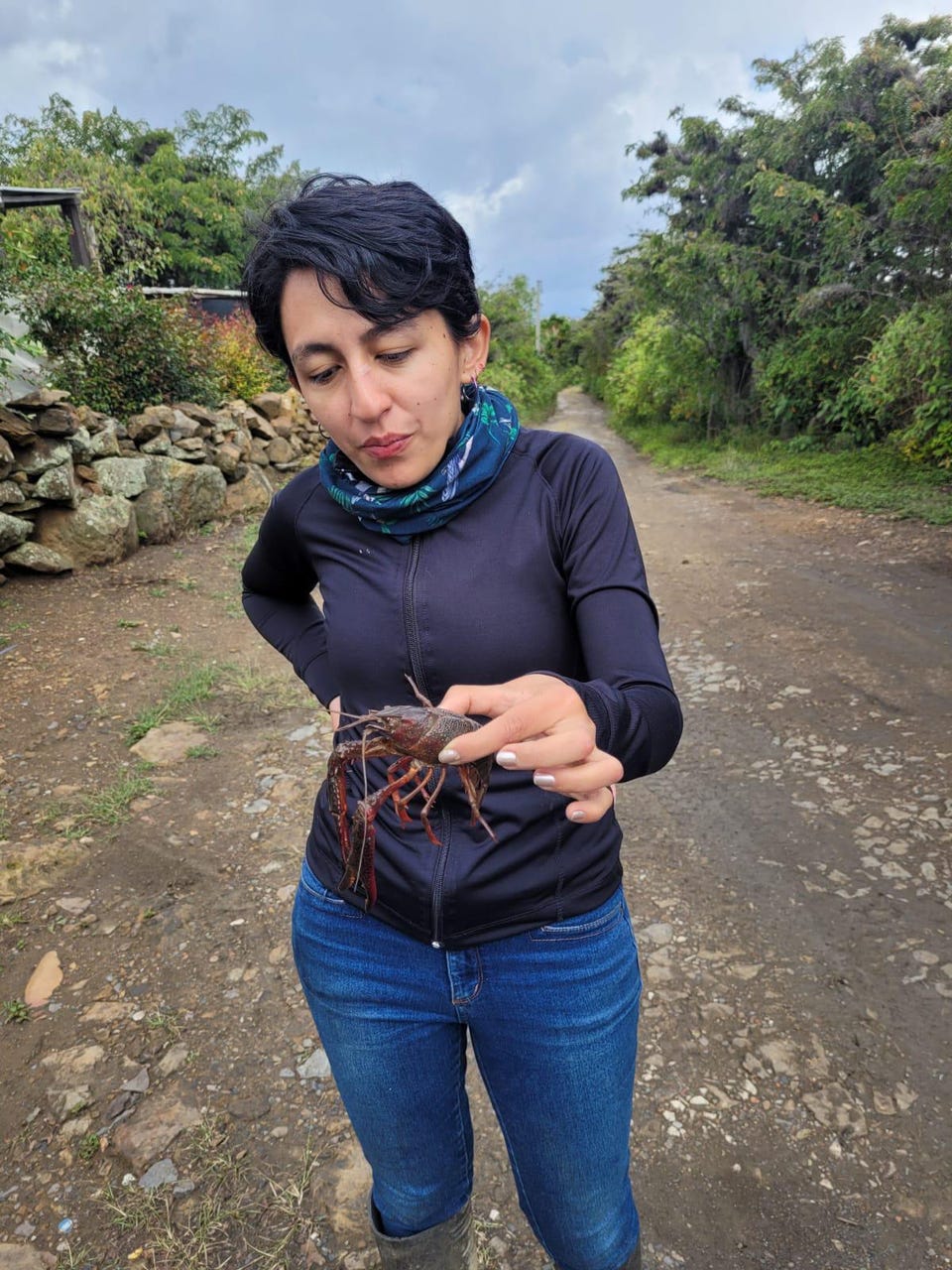Science Education Is Key To Fighting Colombia’s Crayfish Invasion Andrew Wight Contributor Opinions expressed by Forbes Contributors are their own. I am a journalist covering #GlobalSouthScience, tech and development. Following New! Follow this author to stay notified about their latest stories.
Got it! Sep 28, 2022, 10:00am EDT | New! Click on the conversation bubble to join the conversation Got it! Share to Facebook Share to Twitter Share to Linkedin Ada Acevedo-Alonso with an invasive crayfish species (Procambarus clarkii) in Santa Sofia, Colombia. Karen Salas Colombian biologist Ada Acevedo-Alonso is educating communities about an invasive crayfish species while also studying the freshwater creature’s distribution and impacts on the environment. The Louisiana crawfish ( Procambarus clarkii ) is a species native to the southern United States that was introduced into Colombia in the mid-1980s and is now considered an invasive species.
Acevedo-Alonso , who works for the Corporación Autónoma Regional de Boyacá CORPOBOYACA) as a carcinologist and is also an IUCN SSC Freshwater Crustacean Specialist says it is possible that the crayfish are vectors of parasites, bacteria or fungi. “They arrived in Colombia with an ICA permit in 1985 in Valle del Cauca for aquaculture purposes (it did not work) and in 1988 escaped to the Palmira River,” she says. Acevedo-Alonso says her research was a natural choice because in Colombia and even in South America, there are not many people working on freshwater decapods (crabs, shrimps, and crayfishes).
“I’ve been into crabs since 2012, and unfortunately one of the only younger researchers in the country that has dedicated their career to these animals,” she says, adding that the biggest challenge has been that there is little local research about this crayfish. “So there are way too many questions and almost any solutions, she says, “It has been like working from scratch, and due to the urgency of the problem, it’s quite challenging. ” Acevedo-Alonso said her biggest opportunity in her work has been the “National Crayfish Alliance”, a group where any actor related to the management of this invasive species is invited.
MORE FOR YOU New Research Finds A Connection Between Domestic Violence And These Two Personality Disorders This Scientist Helps Andean Forests And Ecuador’s Women In STEM Exceptional Fossil Preservation Suggests That Discovering Dinosaur DNA May Not Be Impossible “I got the opportunity to lead this group, which is a chance to bring to the table the biggest impacts of this species and look for joint solutions, that can make management faster,” she says, “And, of course, I had the opportunity to meet anyone related to a carcinology problem. ” Ada Acevedo-Alonso at the rural school of Vado Castro town in Colombia (July 26 2022). Johana Bello Keen on Crustaceans Acevedo-Alonso was born and raised from Colombia’s capital Bogotá and almost as a hunch, decided to study biology.
“I’ve been passionate about animals and nature since I remember, probably because as a kid my family took me on many walks in the mountains around Bogotá or because my father adopted a calf so he wouldn’t be killed”, she says, “I’ve always said carcinology was love at first sight. ” She says that in her undergraduate crustaceans class something “made a click” and she was hooked. “I knew right away I would work with such creatures.
. . carcinology has fulfilled me in a way I can’t even explain,” she says.
Acevedo-Alonso says that Global South scientists have different perspectives, especially on nature . “We come from a mix of cultures, and our knowledge is an example of it,” she says, “I think we have a different way to make science, that somehow involved our ancestor’s connection to nature and its values. ” Procambarus clarkii getty Another initiative connecting people with science is in Bogota.
MORE FROM FORBES Citizen Scientists Find Over 500 Species Living In This Latin American Mega-City By Andrew Wight Bogota citizen scientists joined 35,00 participants from 159 other cities around the world, who collectively documented over 1000 rare, endangered and threatened species as part of the City Nature Challenge, founded by Lila Higgins and Alison Young in 2016. Follow me on Twitter or LinkedIn . Check out my website .
Andrew Wight Editorial Standards Print Reprints & Permissions.
From: forbes
URL: https://www.forbes.com/sites/andrewwight/2022/09/28/education-is-key-to-fighting-colombias-crayfish-invasion/



